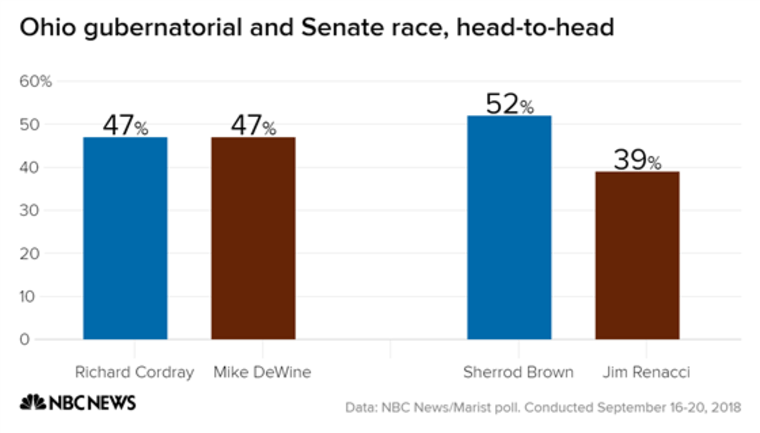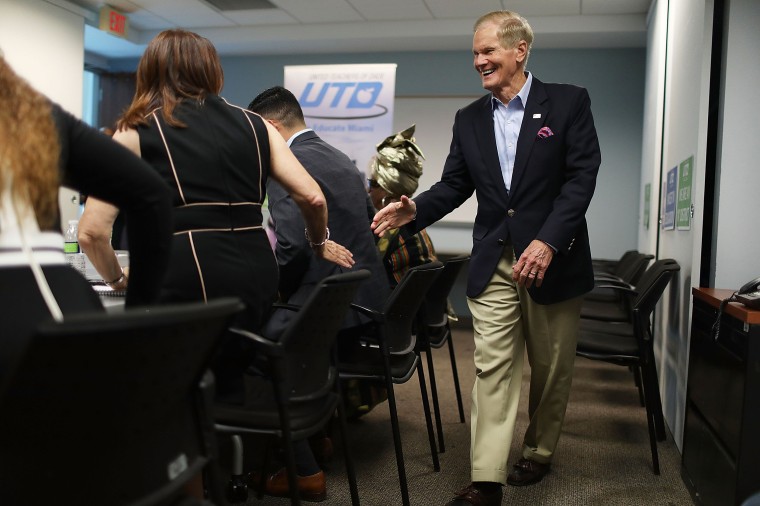WASHINGTON — For most of this political cycle, Florida has appeared to resist any hint of a building blue Democratic wave. Sen. Bill Nelson, D-Fla., has been in the race of his life. There was uncertainty in the gubernatorial contest. There hadn’t been any real House pickups for Dems outside of the Miami area. And President Trump’s job rating has tended to be higher in Florida than in other battleground states.
But that’s all changed one month after the state’s primary. In the gubernatorial race, Democrat Andrew Gillum hasn’t trailed in a single post-primary poll to Republican Ron DeSantis, including in yesterday’s NBC/Marist poll, which showed Gillum ahead by 5 points among likely voters and 8 points among registered voters.
In the Senate race, Nelson is ahead of Republican Rick Scott by 3 points among likely voters in the same NBC/Marist poll, 48 percent to 45 percent. And a Quinnipiac poll released the same day showed Nelson’s lead at 7 points, 53 percent to 46 percent.
“The political environment in Florida, overall, is tipping in the Democrats’ favor,” said Marist’s Lee Miringoff of the NBC/Marist poll.
What’s more, in the battle for the House, the congressional contests of FL-15 (Tampa suburbs) and FL-16 (Bradenton/North Sarasota) are Florida races to keep an eye on.
And as for Trump’s job rating, the NBC/Marist poll has him at 44 percent among registered voters (down from 45 percent in June’s NBC/Marist poll), and 46 percent among likely voters.
Now none of this means that Florida is destined for Democratic success in November. Observers believe the Senate race is thisclose. And Florida political experts always remind us how competitive — and unpredictable — the state is.
But after Andrew Gillum’s surprising primary win a month ago – and it does seem as if he’s pulling the Democratic ticket – Florida doesn’t seem as resistant to a blue wave as it once did.
Are the Democrats’ big leads in IL-GOV and MI-GOV putting more House seats in play?
Speaking of leading gubernatorial candidates pulling the rest of their ticket, don’t lose sight of how Democrats running ahead in the GOV contests in Illinois and Michigan are making House races in those states much more difficult for Republicans. In Illinois, think IL-6, IL-12, IL-13 and IL-14. And in Michigan, think MI-8, MI-11, M-6, MI-7. Just something to keep an eye on…
OH-GOV race is tied, per NBC/Marist poll
And we have one more NBC/Marist poll that we just released. The write-up from NBC’s Ben Kamisar: “Ohio's open governor's race is tied, new polling from NBC News/Marist College shows, as Democrat Richard Cordray and Republican Mike DeWine jockey to replace Republican Gov. John Kasich… Both Cordray and DeWine get support from 47 percent of likely voters; six percent say they're undecided. Among registered voters, it's the same tie at 47 percent each. That's a tightening from NBC/Marist's last poll in June, which showed DeWine up with registered voters, 46 percent to 42 percent.”

“In the Senate race, [Democrat Sherrod] Brown holds a 13-point lead over [Republican Jim] Renacci among both likely and registered voters, 52 percent to 39 percent, unchanged from June's NBC/Marist poll.”
NBC News: Senate Republicans don’t have the votes to confirm Kavanaugh — yet
“Senate Republicans don’t yet have the votes to confirm Supreme Court nominee Brett Kavanaugh, even as Majority Leader Mitch McConnell is projecting a public face of certainty,” NBC’s Leigh Ann Caldwell and Kasie Hunt write.
“But while vote-counters are closely watching a few GOP senators considered to be most threatening to the confirmation, several more Republicans are monitoring events as they unfold and want to see how the hearing with Kavanaugh and Christine Blasey Ford, who has accused him of sexual assault in high school, will play out on Thursday. ‘I know the media keeps characterizing three or four people, but I feel like it’s a large number of them that want to see firsthand the accusation and the rebuttal, and again, will be looking at it in a very sober way,’ Sen. Bob Corker, R-Tenn., said. ‘So I think it’s much larger than you think.’”
“Brett was a sloppy drunk”: Classmates contradict Kavanaugh’s portrayal
In his interview on Fox earlier this week, Kavanaugh portrayed himself as a Boy Scout during his high school and college days, and downplayed drinking alcohol.
“When I was in high school — and I went to an all-boys catholic high school, a Jesuit high school, where I was focused on academics and athletics, going to church every Sunday at Little Flower, working on my service projects, and friendship, friendship with my fellow classmates and friendship with girls from the local all-girls Catholic schools.”
“And yes, there were parties. And the drinking age was 18, and yes, the seniors were legal and had beer there. And yes, people might have had too many beers on occasion and people generally in high school – I think all of us have probably done things we look back on in high school and regret or cringe a bit, but that’s not what we’re talking about.”
“I never did any such thing [as Deborah Ramirez alleges] — never did any such thing. The other people alleged to be there, don’t recall any such thing. If such as thing had a happened, it would’ve been the talk of campus. The women I knew in college and the men I knew in college said that it’s inconceivable that I could’ve done such a thing.”
But Kavanaugh’s classmates and associates from those days are contradicting his portrayal.
“Brett was a sloppy drunk, and I know because I drank with him. I watched him drink more than a lot of people. He’d end up slurring his words, stumbling,” Liz Swisher, a Democrat and chief of the gynecologic oncology division at the University of Washington School of Medicine, told the Washington Post. “There’s no medical way I can say that he was blacked out. . . . But it’s not credible for him to say that he has had no memory lapses in the nights that he drank to excess.”
“He’s trying to paint himself as some kind of choir boy,” Lynne Brookes, a Republican and former pharmaceutical executive, added to the Post. “You can’t lie your way onto the Supreme Court, and with that statement out, he’s gone too far. It’s about the integrity of that institution.”
James Roche, Kavanaugh's college roommate, said in a statement: “Based on my time with Brett, I believe that he and his social circle were capable of the actions that Debbie [Ramirez] described.”
What does it say about Kavanaugh — and the allegations against him — that so many are contradicting his portrayal of himself?
Bredesen says he won’t back Schumer
Politico: “Tennessee Democrat Phil Bredesen said at a debate Tuesday that if he is elected to the Senate, he would not back Minority Leader Chuck Schumer to continue as Democrats' leader. Bredesen made the announcement during the opening statements of his first debate with the Republican nominee, Rep. Marsha Blackburn. Bredesen said Washington had become ‘hyperpartisan’ and blamed current leadership in both parties.”
But Politico adds some important context: “The pledge is functionally useless — unlike in the House, where the speaker is chosen by a majority of the chamber in a floor vote, Senate party leaders are chosen by a majority in a private caucus vote. While there might be enough Democratic House candidates to deny Pelosi the 218 votes she needs to become speaker again, there is virtually no chance of Schumer being dethroned by the Democratic Caucus after the election.”
It’s Debate Night in Virginia
Finally, at 7:00 pm ET, NBC’s Chuck Todd moderates a debate in Virginia’s Senate contest between incumbent Sen. Tim Kaine, D-Va., and Republican challenger Corey Stewart. The panelists are Aaron Gilchrist and Julie Carey of NBCWashington, as well as Mark Rozell of George Mason University.
